Dartis Soil Lab is a geotechnical software for easily processing lab test data for free. Main features that distinguish this product from other tools in this field are as follows:
- User friendly and easy to work with,
- Auto recalculation of sample parameters instantly,
- Auto update of graphs on parameter change,
- Great control over graphs (Make changes, Export to a local drive, Save in program save file),
- Various reports, just one click away after entering data,
- No need for installing big volume database on your hard drive. Save each project as a local save file.
Laboratory Determination of Water (Moisture) Content of Soil and Rock by Mass
ASTM Standard: D-2216
Most laboratory tests in soil mechanics require determination of the water content.
Specific Gravity of Soil Solids by Water Pycnometer
ASTM Standard: D-854 , C-157
The specific gravity of a given material is defined as the ratio of the density of a given volume of the material to the density of an equal volume of distilled water. In soil mechanics, the specific gravity of soil solids (which is often referred to as the specific gravity of soil) is an important parameter for calculating the weight–volume relationship.
Sieve Analysis
ASTM Standard: D-422
In order to classify a soil for engineering purposes, one needs to know the distribution of the grain sizes in a given soil mass. Sieve analysis is a method used to determine the grain size distribution of soils.
Hydrometer Analysis
ASTM: Standard: D-422
Hydrometer analysis is the procedure generally adopted for determining the particle-size distribution in a soil for the fraction that is finer than U.S. No. 200 sieve size (0.075 mm).
Liquid Limit
ASTM Standard: D-4318
When a cohesive soil is mixed with an excessive amount of water, it will be in a somewhat liquid state and flow like a liquid. However, when this viscous liquid is dried gradually, with the loss of moisture, it will pass into a plastic state. With further reduction of moisture, the soil will pass into a semisolid and then into a solid state…
Engineering Classification of Soils (AASHTO, USCS)
ASTM Standard: D-3282, D-2487
Soils vary widely in their grain-size distributions . Also, depending on the type and quantity of clay minerals present, the plastic properties of soils may be very different. Various types of engineering work require the identification and classification of soil in the field.
Proctor Compaction (Standard, Modified)
ASTM Standard: D-698, D-1557
For the construction of highways, airports, and other structures, it is often necessary to compact soil to improve its strength.
Direct Shear
ASTM Standard: D-3080
The shear strength of a given soil can be expressed by Mohr-Coulomb failure criteria.
Constant head permeability
ASTM Standard: D-2424
The rate of flow of water through a soil specimen of gross cross-sectional area A can be expressed as: q = kiA
Falling head permeability
The falling-head permeability test is another experimental procedure to determine the coefficient of permeability of sand.
Unconfined compression
ASTM Standard: D-2166
The unconfined compression strength is determined by applying an axial stress to a cylindrical soil specimen with no confining pressure and observing the axial strains corresponding to various stress levels. The stress at which failure in the soil specimen occurs is referred to as the unconfined compression strength
Consolidation
ASTM Standard: D-2435
When a saturated compressible clay layer is subjected to a stress increase, elastic settlement occurs immediately. Since the coefficient of permeability of clay is significantly smaller than that of granular soil, the excess pore water pressure generated due to loading gradually dissipates over a long period of time. Thus the associated volume change (that is, the consolidation) in clay soils may continue long after the elastic settlement is complete.
* Dartis Soil Lab download link provides trial version of the software.
Soil USCS & AASHTO Classification
Dartis Classify is a soil USCS & AASHTO classification software. Easily classify soils by USCS and AASHTO methods and export results to Excel.
Dartis Classification Suite is designed for processing multiple common soil mechanics test; mainly for purpose of engineering soil classification and reporting.
Dartis Proctor Suite is a soil mechanics lab testing software designed for processing multiple common soil mechanics tests and reporting.
Correlating Soil Properties From SPT Blow Counts
Dartis SPT is a powerful, user-friendly software for correlating soil properties from SPT blow counts. We have gone through many papers and geotechnical reference books and collected over 200 SPT correlations with various soil properties.
Grain Size Distribution Diagram
This is an application that can be used for analyzing Soil Sieve Test.
Submit a review about Dartis Soil Lab software with your social media profile

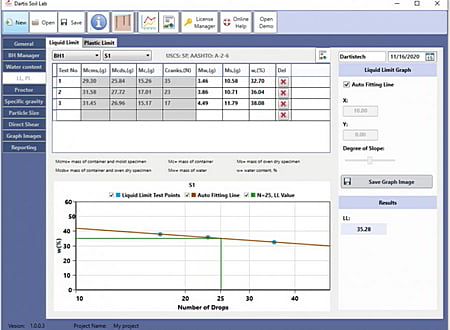
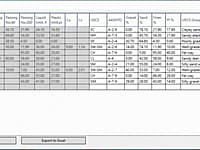
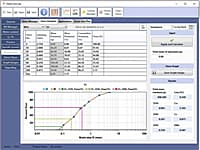
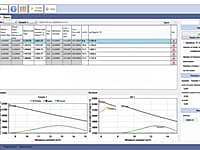
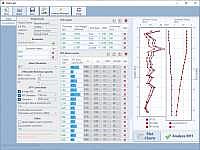
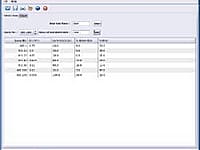
No comments yet. Be the first to comment.